- Home
- Anne Frasier
Play Dead Page 2
Play Dead Read online
Page 2
Contrasting with the beauty was a darkness and mystery that saturated the Southern cityscape. A false Utopia that at once compelled and repelled.
When had the darkness started? David wondered.
Before the Civil War? Before Sherman? Or had Sherman's visit marked the beginning?
Whatever the origins, the darkness had left the city with a strange vibe David couldn't quite put his finger on, but it felt a little like an episode of The Twilight Zone. He just kept hoping Rod Serling would step from behind a building and explain it all to him....
The sun hadn't been up long, but it was already getting muggy. And buggy.
With spring came unpleasantness. Things like sinus headaches. Mold. Wood rot. Palmetto bugs. Which were actually huge, flying cockroaches. Who was anybody kidding?
And rats.
Jesus, the rats. The city was crawling with them. His partner had assured him it wasn't always like this, that the excessive rain and demolition and construction projects had driven the rodents into some of the most touted eating establishments in the city.
They couldn't be poisoned. They'd die in the walls, and wouldn't that be a stinking mess? A couple of restaurant owners had taken to sitting up all night with .22 rifles, blasting the rodents as they made an appearance.
After businesses closed, people gathered outside the darkened windows of Savannah restaurants to watch the rats come out to play. Watch them scurry across tables, knocking down salt and pepper shakers, their eyes glowing.
Spring and warmer weather also brought murder, with the city already breaking last year's record, not that anybody was bragging. Well. Some people may have been.
At the intersection of Abercorn and Gordon, David paused and checked his pager. E. Sandburg, just as he'd suspected. She'd left a message: "Meet me at the morgue."
Quaint.
He headed home, passing a group of young girls jumping rope, chanting a reminder of where he was:
Lady in a black veil
Babies in the bed
Kissed them on the forehead
Now they're both dead.
Red Xs on their gravestones
Black Xs on their lips
Silver dollars where their eyes should be
Mama put a hex.
His apartment was on the third floor of a building called Mary of the Angels.
Once it had housed children orphaned by a yellow fever epidemic that had ripped through Savannah in 1854. After that, it had been the final home to tuberculosis patients during a time when TB was a death sentence.
"Oh, David. This is horrid," his sister had announced when she'd visited the area on a business trip. "Was this the only apartment you could find?"
"It was the first apartment."
Now he unlocked the door and stepped inside, his Siamese cat saying hello, circling his legs and meowing.
Isobel had been his wife's cat. She would be his ex-wife if the lawyers ever got their asses in gear and finished the paperwork. Beth had begged him to take care of Isobel while she lived her new life on death row.
Siamese were supposed to be independent, but Isobel was one of the neediest damn cats David had ever seen. Then again, maybe the traumatic events of the past year had been tough on her too. Maybe she needed a shrink. A kitty psychiatrist.
David took a shower and dressed in gray pants and a white shirt. Shoulder holster and gun. He preferred a .40-caliber Smith & Wesson. He liked the weight, liked the accuracy, and liked the way it fit compactly against his body. He finished off with a jacket that matched his pants.
He'd been in Savannah three months and still felt as if he'd stepped into somebody else's life. As he moved through the days, nothing seemed to touch him—nothing felt real. It wasn't just Savannah. Nothing had felt real in a long time.
Antidepressants did that to a person.
Keys.
Badge.
Handcuffs.
And then there were the assholes at Headquarters who'd given him a hard time since his first day in their lovely city. Especially a couple of detectives David called various names, depending on his mood. Starsky and Hutch. Cagney and Lacey. Crockett and Tubbs. Shari Lewis and Lamb Chop.
They'd started the feud.
What exactly did they have against him?
He was from Ohio.
Translation: the North. The big, bad North, where all the obnoxious, rude Yankees lived.
Apparently the Civil War was still going on; the South just hadn't gotten the memo telling them it was over.
Screw them. He should care, but he didn't.
David knew his detachment wasn't acceptable, knew he should see a local therapist, but he couldn't seem to drum up enough enthusiasm to follow through on the idea. And anyway, he'd been evaluated by FBI psychologists and had been pronounced mentally sound. Why would he want to argue with that? Everybody had problems. Everybody was a little wacko.
Chapter 4
Elise pulled into the morgue parking lot, spotting David Gould's black Honda. He must have been watching for her in his rearview mirror. As soon as she cut the engine of her old yellow SAAB wagon, he stepped out.
A bit under six feet, he was dressed in a loose-fitting suit that made her think of old movies. His hair wasn't short or long, the color somewhere between light and medium brown, a few sun-bleached streaks here and there from hours spent outdoors.
Fellow workers had commented on seeing him running ten miles beyond the city limits. In the dark. In the rain.
Running.
He seemed so perpetually disinterested in everything that it was hard to imagine he could have the ambition to go a mile, let alone ten.
Outwardly, he appeared fairly average, but Elise had occasionally caught something disconcerting in his blue eyes, something that made her uncomfortable and told her David Gould was in no way average.
He had that FBI ability to blend, and if you didn't look at him closely, he seemed like a lot of other men. The kind who wore a suit and worked in an office and exercised four times a week. Had a wife and a couple of kids and cooked out in the backyard on weekends. Went to church on Sundays and could even hide Easter eggs and play Santa Claus upon occasion. Gould could be that man, but he wasn't. Elise knew better.
He wasn't making any effort to become a part of the community. A part of anything. He wasn't winning any friends or influencing people within the Homicide Unit. He didn't seem to care whether anyone liked him or not. She got the idea he just wanted to be left alone.
There was a greenness, an immaturity, about him that Elise suspected was something else. She couldn't classify him in her mind. Who he was. What he wanted. Why he was there.
He had a story; she just didn't know what it was. Yet.
Had he been sent there as some kind of reprimand? Was he just biding his time until he could return to wherever he'd been before Cleveland?
Dr. John Casper was waiting for them. Elise had met him a few times and liked him. He was friendly, natural, unpretentious.
The young doctor's curly hair was messier than usual, his white lab coat wrinkled, looking as if he may have slept in it. His face was pale; his eyes had dark circles under them.
Elise introduced him to her partner, and they shook hands.
"Where's the body?" Gould asked, glancing around the dim hallway.
"Paramedics took him to the hospital."
"Then he's still alive," Elise said.
"If you want to call it that."
Dr. Casper told them about the rush of bodies they'd had, about how everyone was working overtime. "But I don't think it would have mattered if it had been slow. I still don't think anyone would have noticed." He motioned to plastic chairs lined up against a light green wall.
While Elise and her partner settled themselves, Casper pulled a chair around so he sat facing them. The young doctor wiped a shaking hand across his face. "You have bodies do that sometimes."
"Do what?" Elise asked.
"Move. Expel air. It's unsettling as
hell, but it happens."
He crossed an ankle over his knee and began fiddling with his tennis shoe, jabbing the plastic end of the lace into an eyelet. "In med school, we used to deliberately pump bodies full of air so that when a student cut into them—" He stopped short, as if suddenly remembering he wasn't speaking to fellow med students. "Sorry." He was sweating profusely. "I'm just so fucking—oh, shit."
"That's okay," Elise assured him. "Something like this has to be extremely upsetting."
Dr. Casper wiped his face with the sleeve of his lab coat. "I haven't slept in almost two days. I always get a little twitchy when I don't sleep."
"Were you performing the autopsy by yourself?" Elise asked.
"It was getting ready to storm, and I told Willy— he's a morgue assistant—I told him to go home." Dr. Casper laughed, as if something had just come to him. "If Willy had been here when it happened, we'd have a cutout in the wall the shape of a running man." He laughed a little more.
"Did you notice anything unusual about the body?" Gould asked, leaning forward. Forearms on his knees, hands clasped, he appeared almost interested.
"Well, it didn't smell, but I had the downdraft turned on. And contrary to popular belief, not all bodies smell."
Elise wasn't falling for that. Coroners spent so much time around stinking bodies that the mild ones no longer registered.
"And there weren't any signs of lividity. That's rare, but not impossible. I've seen it before. If a body's put in storage right away, it can look pretty fresh." Dr. Casper got an odd expression on his face. "Unless those weren't dead either."
Elise didn't have an answer; she was no good at false reassurance, and she could proudly boast that she'd never in her life uttered the phrase Everything's going to be fine.
She glanced at Gould. He lifted his eyebrows as if to say, This is your show. I'm only your sidekick.
Elise brushed away her impatience to focus on the situation at hand. "We'll need the name of the physician who pronounced him dead and signed the death certificate," she said.
"Already looked it up." Dr. Casper pulled a piece of paper from his shirt pocket and handed it to her. "Dr. James Fritz."
"Know him?"
The young doctor shook his head. "Name's familiar. Never heard anything bad about him, anyway. And we always hear the bad stuff. Apparently the patient had a history of heart disease. Died, or appeared to have died, at home. Wife called 911. No vital signs. At the hospital, he was pronounced dead."
"What about the case three weeks ago?" Gould asked.
Elise was a little surprised he remembered the case of three weeks ago. They hadn't been involved in it. All Elise could recall was that the victim had died shortly after his "awakening."
"Different hospital, different doctor," Casper said. He tugged at his shoestring again. "I became a coroner because I like working with the dead, not the living," he said. "I've never wanted to have anybody's life in my hands."
"Any chance this guy will wake up and tell us what happened to him?" Elise asked.
"My guess is that he's in a vegetative state. He was only taking one shallow breath a minute. The brain needs more oxygen than that."
Gould linked his fingers together. "What about people who've been pulled from frigid water and been clinically dead for hours only to be revived?"
"Ask five doctors their definition of death and you'll get five different answers," Casper told them. "Without the use of expensive equipment, it's sometimes impossible to tell if someone is really dead. The standard for determining death is the irreversible cessation of spontaneous cardiopulmonary functions." He seemed to be regaining some of his confidence now that he was able to reference his medical school education. "We now know that the boundaries between life and death aren't so clear. Hundreds of papers have been written on the subject, with no definitive definition of death."
"Let me get this straight," Gould said. "Are you saying there isn't an established criterion for determining death?"
"The Uniform Determination of Death Act, UDDA, has outlined two specific criteria for determining death, dealing with circulatory and respiratory functions and brain death, but there are no cost-effective tests to measure those things," Casper told them. "The standard procedure is to observe the patient for two minutes for signs of breathing or heartbeat. Even with expensive testing using ECGs and contrast dye X rays, there have been cases of cold-water drownings that have proved even the most sophisticated equipment fallible."
Dr. Casper shook his head, amazed by what he was relating, even though he'd obviously studied the subject. "Here's an interesting tidbit for you: There's actually a group pushing for a standard for determining death that would allow for the burial of brain-dead bodies with spontaneous respiration and heartbeat."
"That's disturbing as hell," Gould muttered while Elise stared at the doctor in horror.
"What was that line from The Wizard of Oz?” Gould asked, looking up at the ceiling. "Something about not being merely dead?"
Casper thought a moment. "'She's not only merely dead—she's really most sincerely dead.' "
Both men laughed, instant comrades.
Elise frowned. She didn't know who irritated her more, Casper, for so easily breaking through Gould's shell, or Gould, for instigating the inappropriate behavior. Or was she just jealous because they were having fun and she wasn't?
That possibility also irritated her.
As Gould caught her glare of disapproval, his laugh quickly fizzled to an aw-shucks crooked smile.
Why, the man was quite charming when he pulled himself out of his malaise.
"Actually," Casper said, managing to get control of himself, "the simplest and best way to know if someone is dead is to wait for him to rot."
Gould glanced at Elise, one eyebrow raised. "The medical field has come so far," he said dryly. "What will it be next? Holding three-day wakes so we can be sure our loved ones are actually dead?"
"Might not be a bad idea," Dr. Casper said, only half joking.
Elise thanked him for his time; then she and Gould headed for the hospital where Truman Harrison had been taken. As far as she knew, she'd never talked to a dead man before.
Chapter 5
Someone was crying.
Elise heard the woman as she and Gould approached Truman Harrison's hospital room. That individual sound of sobbing triggered a companion response, and at least two other people joined in.
Ten feet from the open door, Gould stopped. "Christ." He fell back against the wall as if trying to hide from a shooter.
What now?
"I don't know if I can go in there. I don't like hospitals. I don't like dealing with—" He pointed in the direction of the sobbing. "I don't like dealing with that kind of emotion."
Elise knew it wasn't fair, but she suddenly blamed Gould for everything that was wrong in her life at the moment—the main thing being her lack of time for Audrey. Her reaction may have been extreme, but she didn't have the energy or the inclination to hold David Gould's hand.
"Maybe when you were an FBI agent you could keep your distance," she said, unable to mask her
annoyance, "but dealing with grieving families is part of a detective's job. It's never easy, but it's something we have to do."
"Did I ever tell you about the time I got my appendix out?" he asked with agitation, obviously stalling.
Why couldn't she have gotten a real partner? "This isn't about you," she told him.
"Wait."
Stalling.
"What I have to say makes sense."
She crossed her arms and leaned against the wall. She'd give him one minute.
"When I was twenty years old, I had an emergency appendectomy," he said quickly. "They prepped me, doped me up, and wheeled me into the operating room, where they began administering anesthesia. But instead of knocking me out, the drug made me hyper-aware. My senses were intensified. The nerve endings under my skin were electrically charged." He lifted a hand, fingers spread,
as if to demonstrate. "I could feel the hairs growing from my pores." He lowered his voice to a whisper and leaned closer. "I could hear conversations two rooms away."
"Are you telling me you were awake through the whole operation?" She needed to trade David Gould in for a new model.
"I could feel and hear everything."
"How horrible." She didn't believe him.
"You don't believe me, do you?"
"Well..."
"That's okay. Nobody did. Not the doctors or nurses. Or my parents. My girlfriend. Why should you? But that's not why I chose this moment to tell you a little story about myself. What I'm saying is that our buddy Harrison might be able to hear what's going on around him, even though he's in a coma."
In his roundabout way, Gould was finally making sense. Maybe she wouldn't trade him in just yet. "I'll be careful."
"Assume he can hear everything." "I'll keep that in mind." She looked closely at his ashen face, experiencing a pang of empathy. "You going to be okay?" A partner with a hospital phobia. What other surprises did he have up his sleeve?
He nodded, gave his shoulders a loose shake, and followed her into the room.
A woman in a white suit sat near a sunny window. Two other people, a younger man and woman, hovered nearby. The crying, at least for now, had stopped. A comatose Mr. Harrison was lying in bed, attached to an IV and a heart monitor that pulsed steadily. The woman in the white suit turned out to be Mr. Harrison's wife, the other two people his children.
Elise introduced herself and Gould. "We're going to be looking into the case, trying to find out how your husband ended up in the morgue . . . prematurely."
"He woke up in the middle of the night," Mrs. Harrison explained. "Said he felt sick. On the way to the bathroom he collapsed. I called 911 and an hour later he was pronounced dead."
She started to cry, fought it, pulled in a trembling breath, then continued. "I hate to think of him being put in that body bag. Hate to think of him in that morgue. On the autopsy table—when he was alive. It's a nightmare. That's what it is. A nightmare."

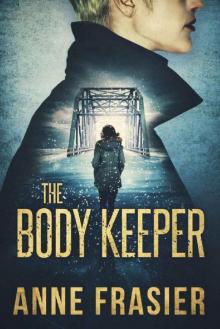 The Body Keeper
The Body Keeper Hush
Hush Play Dead
Play Dead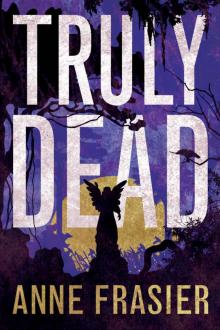 Truly Dead
Truly Dead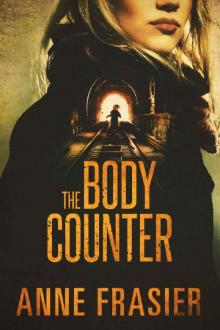 The Body Counter
The Body Counter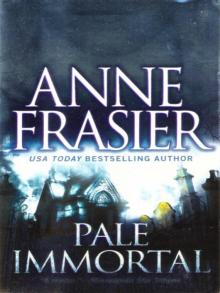 Pale Immortal
Pale Immortal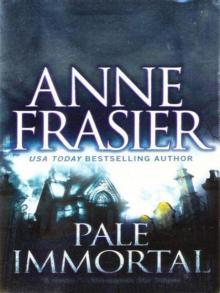 (2006) Pale Immortal
(2006) Pale Immortal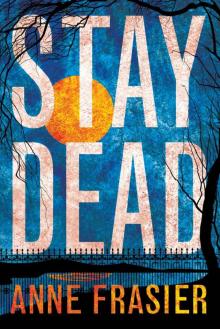 Stay Dead (Elise Sandburg series)
Stay Dead (Elise Sandburg series) Sleep Tight
Sleep Tight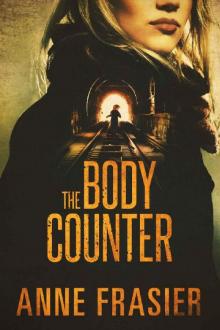 The Body Counter (Detective Jude Fontaine Mysteries Book 2)
The Body Counter (Detective Jude Fontaine Mysteries Book 2)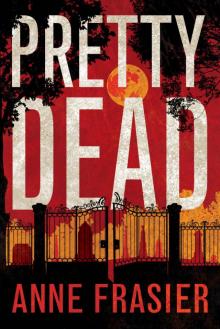 Pretty Dead
Pretty Dead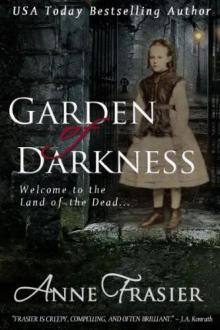 Garden of Darkness
Garden of Darkness